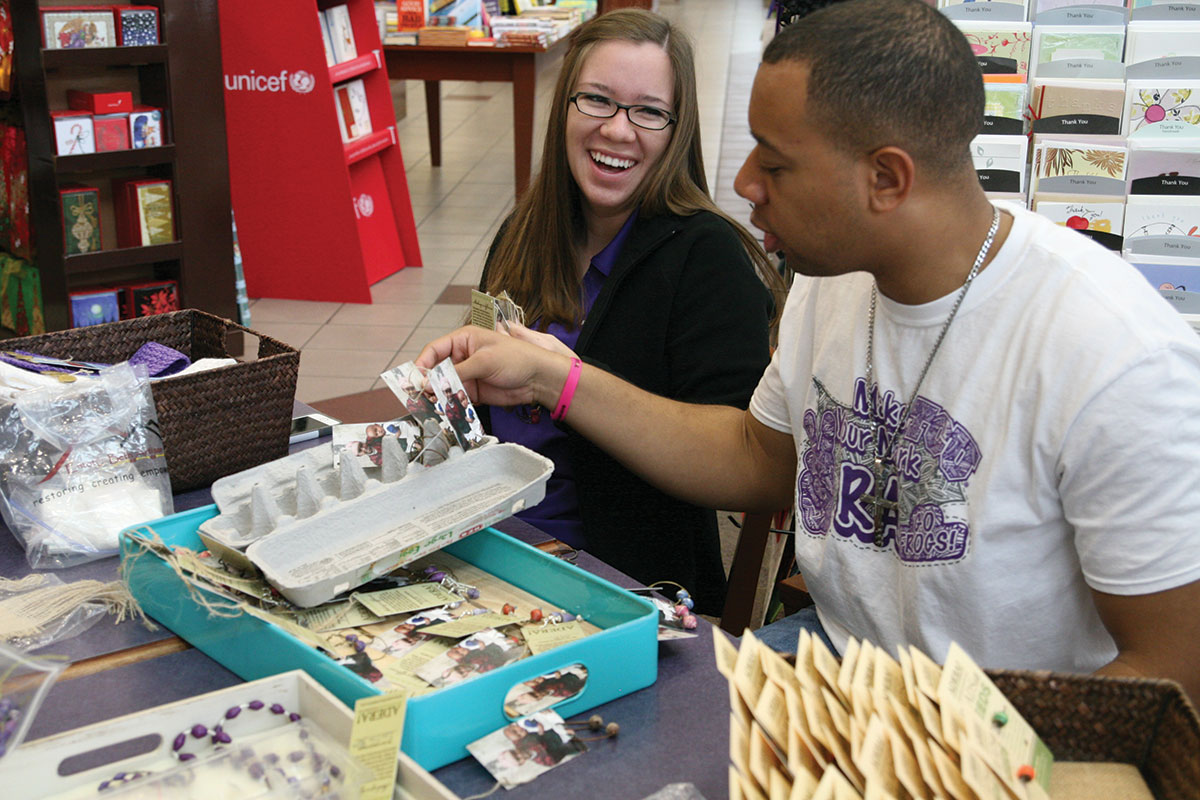Market with values
Students in the M.J. Neeley School of Business’ social entrepreneurship class design and market handmade jewelry to assist struggling women in Ethiopia.

Students sort jewelry in the class Values-centered Entrepreneurship, which served as pro-bono consultants for a group improving the lives of women in Ethiopia.
Market with values
Students in the M.J. Neeley School of Business’ social entrepreneurship class design and market handmade jewelry to assist struggling women in Ethiopia.
How do you build opportunity out of poverty? Students in Dr. David Gras’ Values-centered Entrepreneurship class are learning by doing. They are designing and marketing jewelry, headbands and soap for Ethiopian women to create so they can support their families.
Each student is a pro-bono consultant for the Adera Foundation, which works to improve the lives of desperate people in Ethiopia, including impoverished single mothers with HIV, by generating business revenue activities.
“Usually in our classes we make up products and business plans, but in this class we are actually getting something sold and helping people in Ethiopia. It makes everything we learn more real,” said Melissa Quijano, an entrepreneurship major. “We are learning how to talk to people and get things done, how to delegate and negotiate, how to get a product to a store, and that’s something I haven’t done in any other class.”
Gras, whose research focuses on social entrepreneurship, created the class to complement the Neeley School of Business’ mission to develop ethical leaders with a global perspective to help shape the business environment.
“Very few business schools have social entrepreneurship classes, so this class is a good way to differentiate our entrepreneurship program from other schools,” said Gras, assistant professor of strategy and entrepreneurship. “It also helps top social-minded TCU students recognize the values-centered entrepreneurial potential within themselves and others and gain a real-world understanding of the best practices, opportunities, challenges and issues facing social entrepreneurs.”
The partnership with Adera came about after a meeting in Ethiopia between Dr. Garry Bruton and Julie Miller, executive director of the Fort Worth-based nonprofit organization. They discussed how to build a business out of poverty. Knowing about Gras’ class, Bruton put the two together.
In Gras’ class, 16 students worked in four groups to brainstorm ways to use business principles to improve the lives of Adera’s beneficiaries. One group came up with a headband the women could knit. Another group designed jewelry the women could make. A third group designed bead charm bracelets with a different cause assigned to each bead.
The fourth group came up with designer soap made from the milk of camels, to sell to Ethiopian boutique hotels and other establishments there.
Jacqueline Hunt’s group had the original idea of knitted blankets, but the students had to scale down the plan due to exporting costs. They changed to a headband.
“Knitting is really popular with the women in Ethiopia, so we found an easy pattern, and then we decided to include a special touch using Ethiopian coins as buttons,” said Hunt, whose group named the headband, Amoqa, which means warmth in Amharic.

Molly Landon’s team created jewelry designs in TCU purple. “We came up with different designs for earrings, necklaces and bracelets, then we had a designer create a prototype,” she said. “We told her if we wanted something shorter or longer, in different colors or more beads.” They sent the designed prototypes to Ethiopia.
A student on Landon’s team, Michael Daniels, said, “I like to do things that are hands on and real-world applicable because I plan on being an entrepreneur, so I love being able to work and see the impact that we’re are having on people, even people on other continents.”
Keaton George’s group designed bead bracelets, and he said the project was the most rewarding thing he has done at school so far. “
Another professor, Michael Sherrod, advised me to take this class,” he said. “Within the first couple of weeks I was really impressed with the mix of hands-on learning, academics and presentations.”
Alessandra Papini’s group started with an idea for goats’ milk soap, but the students encountered a problem: Ethiopians don’t milk goats. But the North African natives do milk camels, and the animals’ milk is filled with beneficial nutrients. The group is working to sell the soap to local businesses in Addis Ababa, the capital of Ethiopia.
“Everyone has asked us for a sample, but the U.S. is not our target right now,” Papini said. “It would be awesome to bring it over here large-scale, but we need to start with a customer base and build revenue. We’re in a good position right now and have a potential buyer in Ethiopia.”
Papini said the class opened her eyes.
“Dr. Gras has showed us so many examples of businesses that amaze me with how they have come up with ideas to impact so many people. It helps me to see how other people have become successful by implementing a business plan with a meaning to it. Dr. Gras has done a very good job of putting it in our heads. You need the ‘why’ first.”

Your comments are welcome
Comments
Related Reading:
Campus News: Alma Matters
From Application to Admission
Amid an increasingly selective admission process, Heath Einstein leads the team that builds the TCU community of the future.
Campus News: Alma Matters
From the Chancellor
Chancellor Victor J. Boschini, Jr., identifies what made TCU and its sesquicentennial so memorable.